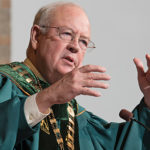The presidential search committee and the presidential search advisory committee have been named at Baylor University. Now, for the good of the “Baylor family,” they need to operate as if they were one committee.
The search committee is composed entirely of Baylor regents—14 of the 15 current regents who will remain on the board when its fiscal year ends this summer—who ultimately will vote to select the university’s next president. The advisory committee is composed of representatives of the Baylor Alumni Association, Faculty Senate, Student Government, Staff Council, Council of Deans, Waco community and Texas Baptists.
Admittedly, a discussion of committee selections at Baylor may seem like “inside baseball.” But given Baylor’s size and influence, the selection of the 14th president of the world’s largest Baptist university will be important to the academic community, the state of Texas, the Baptist General Convention of Texas, and churches whose future ministers and lay leaders will be educated in Waco for generations to come.
Baylor regents Chairman Howie Batson appointed the committees and resisted requests from the Baylor Alumni Association, Faculty Senate and Student Government to seat their representatives as voting members on the search committee. Batson told reporters he studied search processes at about 20 schools and acknowledged, “There is no one right way by which to conduct a search.” But he added both Baylor governing documents and guidelines of the Southern Association of Colleges and Schools, the university’s primary accrediting agency, stipulate “the governing board (regents) is responsible for the presidential selection.”
Advocates for the constituencies’ representation on the actual search committee have recognized the regents’ ultimate authority. But they also have contended the process would be more inclusive—and the ultimate nomination would receive greater buy-in—if representatives from across the Baylor family had an actual vote on the nomination.
That dispute is settled, now that separate committees have been named, and only regents have a seat on the search committee. However, the search committee could take a huge step toward long-term healing and harmony at Baylor if it would announce at its first meeting that it will meet simultaneously with the advisory committee, conduct straw polls in that group, and decline to nominate a candidate that does not receive the overwhelming support of the advisory committee. This would enable the regents to fulfill their fiduciary duties while at the same time giving all the constituencies a strong voice in Baylor’s future.
A key principle here is the difference between rights and responsibilities. Yes, the regents (and, by extension, the regents-only search committee) have the right to choose the next president. But they have a greater responsibility to do what’s best for Baylor. They could even elect the best candidate, but if they don’t nominate that candidate through the best process, the result won’t be best for Baylor.
When they elect a president, the regents will determine the future of Baylor. The university cannot afford for the regents to exert their rights at the expense of alienating alumni and donors, dividing faculty, marginalizing students, and ignoring its closest friends, Texas Baptists and Waco residents.
Fortunately, they can draw from recent positive patterns, when regents appointed Interim President David Garland and Interim Provost Elizabeth Davis last summer. Batson actively consulted with all Baylor constituencies. The result has been unusually strong support for two gifted leaders, and now a much-needed period of peace and progress.
Sign up for our weekly edition and get all our headlines in your inbox on Thursdays
The stakes are even higher in this new presidential search. The regents must do what’s best for Baylor.














We seek to connect God’s story and God’s people around the world. To learn more about God’s story, click here.
Send comments and feedback to Eric Black, our editor. For comments to be published, please specify “letter to the editor.” Maximum length for publication is 300 words.